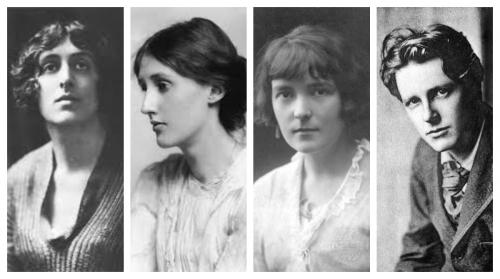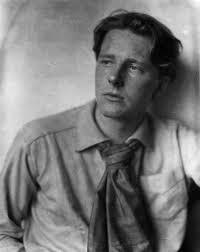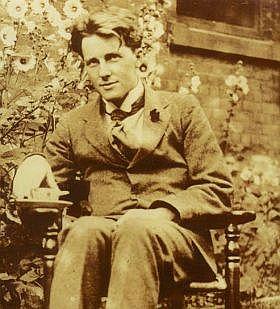
Born Rupert Chawner Brooke, 3 August 1887, in the town of Rugby, Warwickshire, son of a headmaster, Brooke attended preparatory (prep) school locally at Hillbrow, and then went on to Rugby School. At Rugby he was romantically involved with fellow pupils Charles Lascelles, Denham Russell-Smith and Michael Sadleir. In 1905, he became friends with St. John Lucas, who thereafter became something of a mentor to him
While travelling in Europe he prepared a thesis, entitled "John Webster and the Elizabethan Drama", which won him a scholarship to King's College, Cambridge. There he became a member of the Apostles, was elected as president of the Fabian Society, helped found the Marlowe Society drama club and acted, including a performance in the Greek Play.

He was known for his boyish good looks, which were said to have prompted the Irish poet W. B. Yeats to describe him as "the handsomest young man in England"
The friendships he made at school and university set the course for his adult life, and many of the people he met - including George Mallory- fell under his spell. Virginia Woolf once boasted to Vita Sackville-West of going Skinny-dipping with Brooke in a moonlit pool when they were in Cambridge together.
“ . . .all that could be kind and interesting, substantial and good-hearted . . . he had such a gift with people, and such sanity and force . . .”
- Virginia Woolf
Brooke made friends among the Bloomsbury group of writers, some of whom admired his talent while others were more impressed by his good looks. He also belonged to another literary group known as the Georgian poets and was one of the most important of the Dymock poets, associated with the Gloucestershire village of Dymock where he spent some time before the war. The group published their own quarterly, entitled 'New Numbers', containing poems such as Brooke's "The Solider". He also lived at the Old Vicarage, Grantchester, which stimulated one of his best-known poems, named after the house, written with homesickness while in Berlin in 1912.
"...Say, is there Beauty yet to find? And Certainty? and Quiet kind? Deep meadows yet, for to forget The lies, and truths, and pain? . . . oh! yet Stands the Church clock at ten to three? And is there honey still for tea?"
In Grantchester, his days were lived with friends out in the open air: going barefoot, sleeping out, walking, camping. Virginia Woolf described Rupert and his circle as ‘neo-pagans’.

Brooke suffered a severe emotional crisis in 1912, caused by sexual confusion (he was bisexual) and jealousy, resulting in the breakdown of his long relationship with Ka Cox (Katherine Laird Cox). As part of his recuperation, Brooke toured the United States and Canada to write travel diaries for the Westminster Gazette. He took the long way home, sailing across the Pacific and staying some months in the South Seas. Much later it was revealed that he may have fathered a daughter with a Tahitian woman named Taatamata with whom he seems to have enjoyed his most complete emotional relationship. Many more people were in love with him.

Brooke enlisted at the outbreak of war in August 1914. He came to public attention as a war poet early the following year, when The Times Literary Supplement published two sonnets ("IV: The Dead" and "V: The Soldier") on 11 March; the latter was then read from the pulpit of St Paul's Cathedral on Easter Sunday. Brooke's most famous collection of poetry, containing all five sonnets, 1914 & Other Poems, was first published in May 1915 and, in testament to his popularity, by June 1918 had reached its 24th impression. Brooke's accomplished poetry gained many enthusiasts and followers including Edward Marsh, who brought him to the attention of Winston Churchill, then First Lord of the Admiralty.
“Well, if Armageddon is on, I suppose one should be there”.
- Rupert Brooke
Brooke sailed with the British Mediterranean Expeditionary Force on 28 February 1915 but developed sepsis and he died at 4:46 pm on 23 April 1915, on the French hospital ship the Duguay-Trouin, moored in a bay off the Greek island of Skyros in the Aegean Sea, while on his way to the landing at Gallipoli. As the expeditionary force had orders to depart immediately, Brooke was buried at 11 pm in an olive grove on Skyros. The site was chosen by his close friend, William Denis Browne, who wrote of Brooke's death:
"I sat with Rupert. At 4 o’clock he became weaker, and at 4.46 he died, with the sun shining all round his cabin, and the cool sea breeze blowing through the door and the shaded windows. No one could have wished for a quieter or a calmer end than in that lovely bay, shielded by the mountains and fragrant with sage and thyme."


I first discovered Rupert Brooke when rummaging in The Red Library of Duffryn House. I came across a small booklet that was a little torn and aged brown at the edges, which had been hidden at the very bottom of the very small poetry section. On the cover it read 'Twenty Poems by Rupert Brooke' and beneath, a side profile portrait of a young handsome man almost faded from the paper completely. Published in 1943 and 47 pages long, it has the feeling of being well loved, and I felt it was soon to become a treasured possession of my own, and on page 15 rested my favourite poem of his.
Retrospect
In your arms was still delight,
Quiet as a street at night ;
And thoughts of you, I do remember,
Were green leaves in a darkened chamber,
Were dark clouds in a moonless sky,
Love, in you, went passing by,
Penetrative, remote, and rare,
Like a bird in the wide air,
And, as the bird, it left no trace
In the heaven of your face.
In your stupidity I found
The sweet hush after a sweet sound.
All about you was the light
That dims the grading end of night ;
Desire was the unrisen sun,
Joy the day not yet begun,
With tree whispering to tree,
Without wind, quietly.
Wisdom slept within your hair,
And long suffering was there,
And in the flowing of your dress,
Undiscerning Tenderness.
And when you thought, it seemed to me,
Infinitely, and like a sea,
About the slight world you had known
Your vast unconsciousness was thrown....
O haven without wind or tide !
Silence, in which all songs have died !
Holy books where hearts are still !
And home at length under the hill !
O mother-quiet, breasts of peace,
Where love itself would faint and cease !
O infinite deep I never knew,
I would come back, come back to you,
Find you as a pool unstirred,
Kneel down by you, and never a word,
Lay my head, and nothing said,
In your hands, ungarlanded ;
And a long watch you would keep ;
And I should sleep, and I should sleep
Mataiea, January 1914
Reading Recommendations & Content Considerations
by by
Rupert Brooke Christopher Hassal


























































